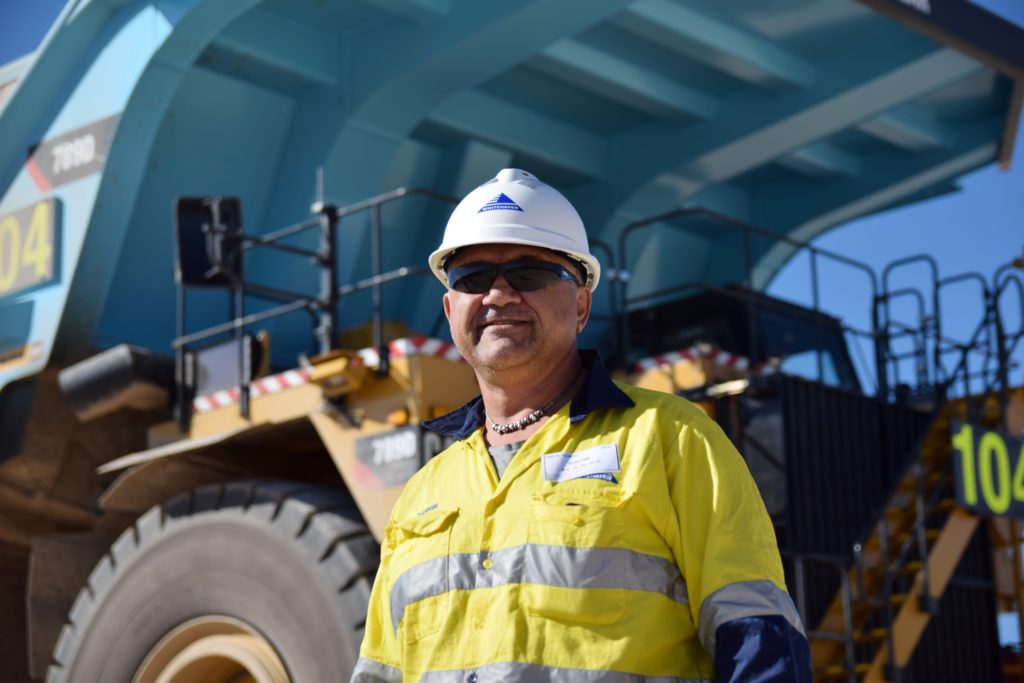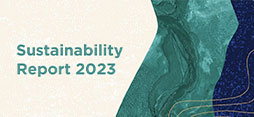16 April 2015
Opportunity with Whitehaven a “dream come true”

Courtesy of the April/May 2015 edition of Coalface magazine
Indigenous employment has always been a strong focus for Whitehaven Coal and the Maules Creek Project has been an opportunity to translate the company’s commitment into action. In March, the company exceeded its voluntary goal of a 10% Indigenous employment rate, reaching 15.5 percent, with 30 Aboriginal people on the Maules Creek operation.
Paul Flynn, CEO and Managing Director of Whitehaven Coal says recognising the disadvantages many Aboriginal people in the region are facing was a driving force in Whitehaven Coal committing to supporting and encouraging the development and of local Aboriginal people, and opening a meaningful dialogue with that community.
“The genesis of the Maules Creek employment commitment came from my initial meetings with the local Councils when I first came into the role,” Mr Flynn says. “They told me they were struggling with the disproportionate unemployment in the aboriginal community which represented some 8 to 9% of the population in the region.
“It was obvious that with a workforce yet to be recruited for Maules Creek, we were not tapping into this of the potential employment pool.”
With this knowledge, when Whitehaven was able to start construction at Maules Creek, the Indigenous employment program was a top priority in the recruitment process.
As well as their own internal program, this focus has extended beyond Whitehaven, with the company actively working with its contractors and suppliers to provide similar opportunities for Indigenous job seekers across a broader business community.
Darrin Trindall, a trainee plant operator at Whitehaven Coal’s Maules Creek operation, is an example of the success the program is having. Employed late last year as part of Whitehaven’s Indigenous employment program, the role was the fulfilment of a long-held dream of returning to live and work in his traditional homeland of Narrabri.
“I have always wanted to be a plant operator,” Mr Trindall says. “And when the opportunity with Whitehaven came up, I went for it.
“I’d spent 12 years working as a nurse in remote Aboriginal communities in the Northern Territory, and then went into civil construction. Once I had children, I wanted a career change, and I have always wanted to come home to Narrabri, so for me the opportunity at Whitehaven was a dream come true.”
While Mr Trindall was grateful for the opportunity the Indigenous employment program offered, he wanted to be sure he was being employed for the right reasons, not just as a token gesture.
“I didn’t want to get the job on anything but my own merits,” Mr Trindall says. “And that’s what is great about Whitehaven. The Indigenous employment program isn’t about them just being able to show a few Aboriginal faces on their staff list; it’s a really genuine program where opportunities are created for the Indigenous community, but we still have to be qualified and we have to earn the job.”
Now that he is in the job and behind the wheel, Mr Trindall says the reality is even better than the dream.
“I love my job,” he says. “It’s challenging sometimes. People think you are just driving a big truck from one spot to another but it’s so much more than that. You have to be on the ball all the time, there is a lot of multi-tasking, and you have to be always conscious of safety issues, but I just love it.”
Mr Trindall says his three boys, Bilay, 9, Trindall, 7, and Dougamoy, 5 reckon he has the best job in the world.
“Driving a big truck all day is pretty impressive to my boys,” he says.
Darrin says his worries about tokenism have been proved wrong, tenfold.
“Working at Whitehaven is even better than I expected,” he says. “Being employed as part of the Indigenous employment program, I was worried when I started that there might be a sort of ‘them and us’ mentality. I worried that the other people working at the mine might think I was just handed this job on a platter because I’m Aboriginal. So I made it clear from the start that I don’t want to be treated any differently – I have to abide to the same rules and policies.
“I’m just here to work hard and provide for my family. And it’s great. There is no ‘them and us’. That’s why the retention rate is so good at Whitehaven. Everyone is really supportive. Everyone is treated equally.”
This type of workplace equality is at the heart of the Indigenous employment program at Whitehaven.
When the company welcomed Darrin as part of the round of new permanent employees to their Maules Creek open cut coal project in August 2014, the company had a goal of a 10 percent Indigenous employment rate.
Whitehaven has now exceeded that voluntary target, reaching 15.5 percent, with 30 Aboriginal people on the Maules Creek operation.
However for Whitehaven, their Indigenous employment program is not about numbers. It’s about people.
Bob Sutherland, Aboriginal Community Relations officer with Whitehaven Coal says the program is about “results, not rhetoric”.
“Whitehaven made the goal of 10 percent to reflect the percentages of the local communities of Narrabri and Gunnedah,” Bob says. “And we have exceeded that. It’s a really high number by industry standards, but it was never about setting a percentage as a goal then sitting back and saying ‘Well, we’ve done our bit’. What’s really positive about Whitehaven – and what made me decide to take on this job – is that the whole company sees this as an integral part of our business.
“Although we are really happy with the numbers, that’s not what we judge or success on. We will be judged on the long term outcomes, and the stories of people like Darrin are speaking for themselves.”
Mr Sutherland says along with Mr Flynn and Mr Cole, the entire management team have championed the cause.
“Paul Flynn, CEO and Managing Director; Jamie Frankcombe, our Executive General Manager of Operations; Peter Wilkinson, General Manager of Maules Creek; and Matt Sparkes, Mine Manager of Maules Creek, are all 100 percent behind the Indigenous employment program and are making sure that we deliver.”
Whitehaven says their approach to Indigenous employment focuses on practical and meaningful engagement with the community, and initiating programs that will address issues affecting Aboriginal people within the region. A current initiative has seen Whitehaven provide sponsorship to the Winanga-Li Aboriginal Child and Family Development Centre in Gunnedah to fund bus pick ups, ensuring that families and children can get to Winanga-Li centre and develop an understanding of the benefits that school brings.
The company believes the best way they can assist in improving the lives of local Aboriginal people is by offering the opportunity of stable, long-term employment and by supporting access to education – from kindergarten through to university and mature age.
To achieve this, they say communication is the key; effective and open communication underpinned by a mutual respect and understanding of each other’s concerns and reasonable expectations.
It is this mutual respect that has impressed Darrin so much during his time at Whitehaven.
Derek Talbott was employed at the same time as Darrin, working on the Maules Creek Project then securing work with Leighton Contractors on the Maules Creek site. He too says the opportunity has been overwhelmingly positive.
Born and bred in Gunnedah, the search for work took him further north, and the role at Whitehaven has given him the opportunity to come home with his wife and children.
“I’m enjoying it,” Derek says. “Work has been scarce around here, but I’m really pleased to be able to come back home and take full advantage of the opportunity Whitehaven has given me.
“My whole family including Mum and Nan are ecstatic about me securing a career in the mining industry.”
Bob Sutherland says initiatives like this that bring about generational change for people like Darrin and Derek.
“These are well paying jobs and that goes back into the community and allows families to improve educational and social opportunities which in turn leads to more employment opportunities in the future,” Bob says.
Within the next ten years Whitehaven expects that Aboriginal people will be engaged more broadly across roles in the business, moving beyond operator and trades and into fields such as engineering, environmental, safety and training, and finance.
Whitehaven says this is part of a long term goal to be a company that Aboriginal people see as a preferred place of employment; a work environment where values such as the Maules Creek values of ‘Respect, Performance, Discipline, Commitment, Integrity and Teamwork’ are considered the norm.
Whitehaven is also implementing programs aimed at increasing the company’s female workforce, and female Indigenous workforce, working on strategies to increase those numbers.
Back to News“The women can do any job the blokes can, so we are definitely going to raise those numbers,” Mr Sutherland says. “We have a lot of really positive plans and I’m excited to be part of it.”
 Whitehaven coal
Whitehaven coal

